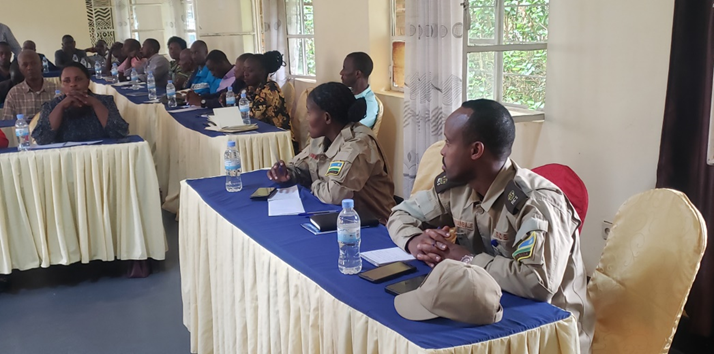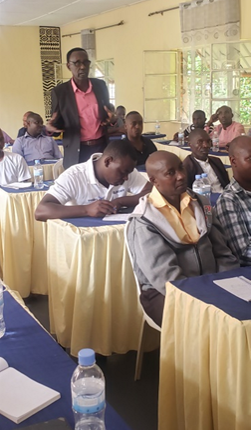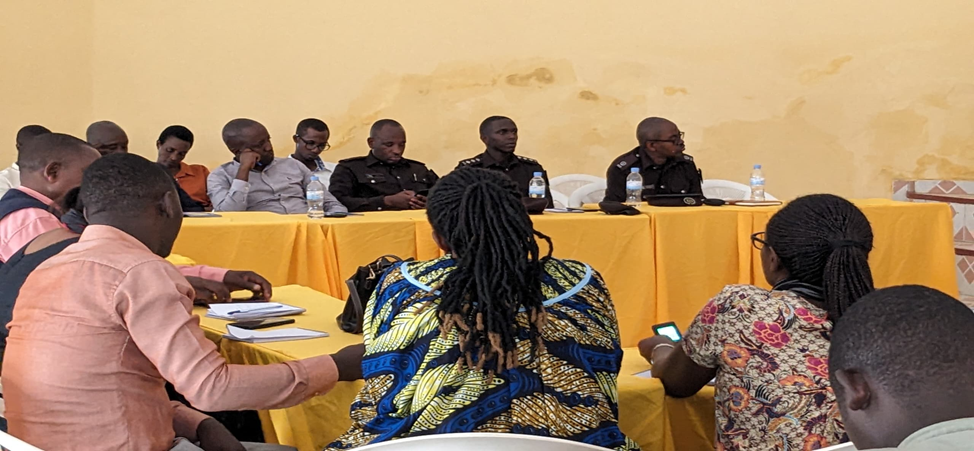PSYCHO-EDUCATION TRAINING OF LOCAL AND OPINION LEADERS/ SEPTEMBER, 2024.
Local leaders and opinion leaders play a key role at community level in solving conflicts and facilitating reconciliation processes. They are also often confronted with the present-day consequences of the genocide, in some cases without being aware of this.It is important that they recognize that some of the behavioral issues or conflict situations they handle daily may be connected to individuals’ and community traumas, including the effects genocide legacies can have on the second generation. This will help them to address the root causes instead of treating the symptoms. It is also important that they understand the connection between the healing and reconciliation process with the socio-economic development in their communities. As a result, these leaders are likely to prioritize citizens’ mental health and reconciliation agenda in their performance contracts.


Psycho-education Training of Local and Opinion Leaders at Ngoma District.
After the third year of the implementation, most of local Leaders have been transferred to other sectors or cells, while some opinion leaders completed their term and others were elected. It was then crucial to organize another psycho-education training to inform the new appointed local leaders and new elected opinion Leaders about the program and its interventions in their administrative localities (sectors and cells). This will allow them to better understand the role of the program to support societal healing efforts as well as its intended contribution to improving social cohesion.
It is against this background that DIDE in partnership with Interpeace and in collaboration with Prison Fellowship Rwanda and Haguruka organized a psycho-education training for local leaders, opinion leaders, to ensure ownership and increase awareness on the need for healing in the Rwandan community as well as providing participants a space to share their experiences.
Local and opinion leaders participating in a psychoeducation training session in Nyagatare & Musanze Districts
I.1 Objectives of training
The overall goal of this psycho-education training is to increase awareness on trauma and the need for healing towards social cohesion. It also aims to equip leaders with skills in conflict sensitive skills to ensure a Do no harm approach that emphasizes connectors and minimizes dividers to promote conflict sensitive leadership and development through understanding psychological trauma and healing strategies.
I.2 Expected outcomes
- Increased understanding of local leaders in trauma healing strategies
- Improved working environment and service delivery to beneficiaries.
- Increased resilient capacities among leaders
- Increased critical thinking skills and conflict analysis
I.3 Methodology
The interactive method has been used during this training workshop to require active participation. More, precisely it consisted of short presentations alternating with the work in groups, the pooling in the plenary and the consolidation at the end.
- Short presentations aimed at refreshing the memory of participants by providing basic mental health, social cohesion and collaborative livelihood knowledge.
- Work in groups to foster interactions through which participants would share their practice (know-how) and experience; without any doubt, this exercise has a formative character among peers;
- Plenary sharing and discussions were accompanied by insights provided by the trainers as a way of consolidating / or developing some important elements.
- Recommendations emerging from the discussions were collected throughout the Exchanges;
I.4 M&E Methodology
This activity was monitored using different tools:
- A presence list to be signed by participants upon arrival.
- Observations and note taking carried out by one designated staff to extract quotations from trainers and participants.
I.5 Participants
A total of 228 participants attended the trainings among them 65 were Female and 163 were Males.
I.6 Gender analysis
The number of men participants were high compared to women (163 men out of 65 women) Due to participants are Leaders at cell and sector level, this shows that women are still underrepresented in leadership positions even for opinion leaders who were recently elected.
Although the women participants were fewer, they participated often, giving ideas, and asking questions.
II.CONTENT DEVELOPMENT
A one-day psycho-education training was organized by DIDE in Partnership with Interpeace, Prison Fellowship Rwanda and Haguruka on September 25th, 2024 and have been carried out in the Five Districts of the programme intervention namely Ngoma, Nyabihu Nyagatare, Nyamagabe and Musanze.
The objective of this psycho-education training was to equip local leaders and opinion Leaders with the necessary skills to address mental health challenges, promote social cohesion, and support collaborative livelihood efforts in their communities.
The key topics covered were Psychosocial and mental health awareness and its impact on community, social cohesion and conflict resolution and promoting economic resilience through collaborative livelihood. Participants were encouraged to share their insights on these topics, providing an opportunity for deeper discussion and engagement aimed at examining collectively the challenges they encounter in their daily work, particularly concerning mental health, social cohesion, and collaborative livelihood.
We expected the following outcomes and all have been achieved :
- Increased awareness on the role of the program to support societal healing efforts as well as its intended contribution to improving social cohesion.
- Increased understanding of local and opinion leaders in trauma healing, mental health support and their role in addressing stigma and misconceptions around mental health
- Increased understanding of local and opinion leaders on social cohesion and conflict resolution and their role in fostering social cohesion within diverse community members.
- Increased understanding of local and opinion leaders on collaborative livelihood and its relation with mental health and social cohesion.
- Improved working environment and service delivery to beneficiaries through leading with empathy and inclusion.
II.1 Outcome of the Training
The psycho-education training was successful as it addressed local and opinion Leaders daily life issues, and the participants appreciated our support for their community:
- Participants developed a foundational knowledge of what mental health is and its importance in daily functioning; they are aware of common health issues in their community (PTSD (trauma), anxiety, depression, stress, and drug and alcohol abuse) and how these can impact individuals.
- Participants gained insight into common myths and misconceptions about mental illness, and then committed to address stigma and misconceptions around mental health and promotes a more compassionate and informed perspective.
- Participants improved their communication skills, especially in active listening and committed to offer practical and emotional support in a non-judgmental, empathetic manner, fostering trust and openness.
- Participants became aware of existing local mental health resources, support services available in their communities as well as professional networks and committed to refer those in need of support.
- Participants became more aware of their stressors and committed to adopt strategies for building personal resilience and preventing burnout.
- Participants became aware of barriers to social cohesion in their respective community, an essential element in fostering unity, trust and collaboration within communities.
- Participants committed to support existing activities aimed at fostering social cohesion within diverse community members by developing trust-based relationships within diverse groups in the community.
- Participants became aware of existing opportunities available in their community and committed to foster community-based enterprises aimed at building economic resilience and reducing dependency.
- Participants committed to enhance community ties through shared economic goals.
At the end of the training each District shared some mental health and psycho-social issues that are still present in their region, some challenges that still hinder social cohesion within their community are presented too as well as opportunities that are available their region that could help people improve their livelihoods.
We also took the opportunity to assess the relevance of such trainings, if it helped them to improve the local and opinion Leader’s way of Working and it addresses some of their past challenges.

